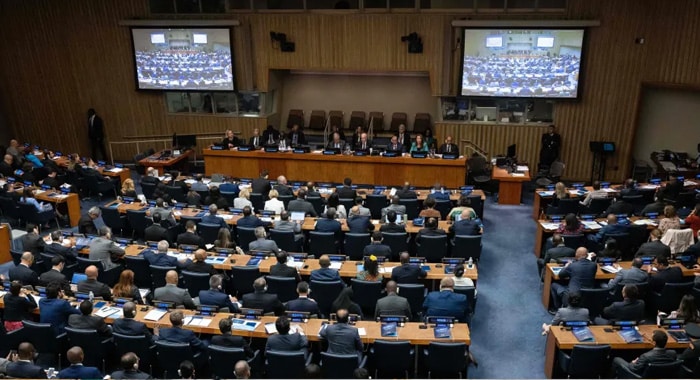In a significant diplomatic milestone, Pakistan has been appointed to chair the powerful United Nations Security Council (UNSC) 1988 Taliban Sanctions Committee for the year 2025 placing Islamabad at the helm of one of the most sensitive and consequential global security mechanisms related to Afghanistan.The 1988 Sanctions Committee, comprising all 15 members of the Security Council, enforces measures including asset freezes, travel bans, and arms embargoes against individuals, groups, and entities associated with the Taliban that pose a threat to the peace, stability, and security of Afghanistan. Pakistan’s appointment to lead this body signals growing international recognition of its strategic role in regional peace building and counter terrorism diplomacy.
Guyana and Russia will serve as Vice-Chairs of the committee alongside Pakistan. The announcement was made through an official release of the new leadership chart for UNSC subsidiary bodies. As part of its broader engagement, Pakistan has also been designated as Vice-Chair of the 1373 Counter-Terrorism Committee tasked with monitoring the global implementation of counter terrorism resolutions. Algeria will chair the committee in 2025, with France and Russia also serving as Vice-Chairs.
Additionally, Pakistan has been entrusted with co-chairing two informal working groups: one on Documentation and Other Procedural Questions, and another on General Sanctions Issues reinforcing its expanded footprint across key UNSC deliberations. Pakistan is currently serving as a non-permanent member of the Security Council for the 2025–26 term, alongside Algeria, Denmark, Greece, Guyana, Panama, South Korea, Sierra Leone, Slovenia, and Somalia. The five permanent members remain China, France, Russia, the United Kingdom, and the United States.
Denmark will chair the 1267 ISIL (Da’esh) and Al-Qaida Sanctions Committee, with Russia and Sierra Leone as Vice-Chairs, completing the trio of key sanctions bodies focused on global terrorism threats. The latest appointments follow UNSC elections held on June 3, in which Bahrain, the Democratic Republic of the Congo, Liberia, Latvia, and Colombia were elected as non-permanent members for the 2026–27 term, beginning January 1, 2026.
India, during its 2021–22 tenure as a non-permanent member, chaired the Counter-Terrorism Committee in 2022 and has repeatedly accused Pakistan of harboring UN-proscribed terrorist entities. Indian officials have cited the presence of Osama bin Laden in Abbottabad—where he was killed in a 2011 US special forces raid—as evidence of Pakistan’s alleged complicity. Islamabad has consistently rejected such allegations and maintains that its counter terrorism efforts are in full compliance with international law and UN mandates.
Pakistan’s leadership of the Taliban Sanctions Committee marks a turning point in its international engagement, offering a critical platform to shape the global discourse on Afghanistan and reinforce its commitment to peace, stability, and multilateral diplomacy. This appointment not only reflects the trust of the international community in Pakistan’s diplomatic maturity but also positions it at the core of the UN’s most consequential deliberations on regional security and counter terrorism.





